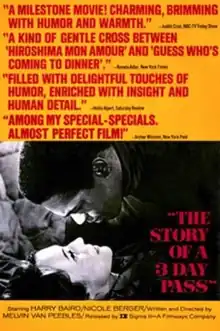The Story of a Three-Day Pass
The Story of a Three-Day Pass (French title: La Permission) is a 1967 film written and directed by Melvin Van Peebles, based on his French-language novel La Permission. It stars Harry Baird as a black American soldier who is demoted for fraternizing with a white shop clerk (Nicole Berger) in France.
| The Story of a Three-Day Pass | |
|---|---|
 | |
| Directed by | Melvin Van Peebles |
| Screenplay by | Melvin Van Peebles |
| Based on | La Permission by Melvin Van Peebles |
| Produced by | Guy Belfond |
| Starring | |
| Cinematography | Michel Kelber |
| Edited by | Liliane Korb |
| Music by | Melvin Van Peebles |
| Distributed by | Sigma III Corp. |
Release dates |
|
Running time | 87 minutes |
| Country | France |
| Languages |
|
Along with writing and directing the film, Van Peebles collaborated on its score with Mickey Baker and sings one of the two songs written for the film, "When My Number Gonna Hit". The other song, "Hard Times", is a duet; one of the singers is Mickey Baker. The film premiered in 1967 at the San Francisco International Film Festival.[1] In 2020, the film was one of the selections of the Cannes Classics section at the Cannes Film Festival.[2]
Plot
The film tells the story of Turner, a black U.S. Army G.I. stationed in France whose captain gives him a three-day pass just after he promotes him. As Turner gets ready to leave, his reflection in the mirror accuses him of being an Uncle Tom, but this is not the only time his reflection criticizes him or makes him doubt himself.
Turner goes to Paris, where he wanders mostly aimlessly for the first day. He finds himself in a nightclub, where he meets a white French shop clerk named Miriam. The pair spends the rest of the weekend together, enjoying their romance but also struggling with the complexities of racism. Eventually their miscegenation is reported to Turner's captain and Turner is restricted to barracks. After some visiting African-American women convince his commander to lift the restriction, he finds his girlfriend unavailable when he telephones her, and he decides that such amorous adventures are futile.
Cast
- Harry Baird as Turner
- Nicole Berger as Miriam
- Hal Brav as Turner's Captain
Production
The film was shot over a period of six weeks for a cost of $200,000.[3]
Reception
In 2020, The New Yorker critic Richard Brody described The Story of a Three-Day Pass as being "among the great American films of the sixties."[4]
References
- Rapold, Nicolas (6 May 2021). "The Film That Made 'Sweet Sweetback's Baadasssss Song' Possible". The New York Times. Retrieved 6 May 2021.
- Keslassy, Elsa (15 July 2020). "Cannes Film Festival Unveils Cannes Classics 2020 Lineup". Variety. Retrieved 9 October 2020.
- Mendik, Xavier; Schneider, Steven Jay, eds. (2003). Underground U.S.A.: Filmmaking Beyond the Hollywood Canon. Wallflower Press. p. 97. ISBN 978-1903364499.
- Brody, Richard (12 June 2020). "What to Stream: "The Story of a Three-Day Pass," a Precursor to Spike Lee's "Da 5 Bloods"". The New Yorker. Retrieved 19 April 2021.
External links
- The Story of a Three-Day Pass at IMDb
- The Story of a Three-Day Pass at AllMovie
- La Permission EP info from Blaxploitation.com
- The Story of a Three Day Pass: Ordinary Love an essay by Allyson Nadia Field at the Criterion Collection